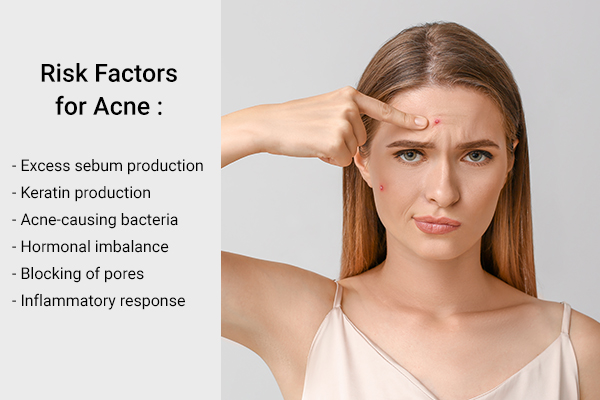In this article:
Acne is a very common inflammatory skin ailment that concerns more than 9% of the global population. This condition may come up during the teenage years and continue until the early thirties. It is more common in females and the urban population. (1)(2)

The link between diet and acne has been studied extensively. Recent research shows that diet may play a substantial part in the development of acne.
Studies also suggest that a high glycemic diet is more likely to contribute to acne development than other dietary factors such as consuming almonds. (3)
The Relationship Between Almonds and Acne
There’s not enough research to establish whether almonds cause acne or not. The hypothesis that links almonds to acne is based on the belief that almonds contain high levels of omega-6 fatty acids. This is because a diet containing considerable amounts of omega-6 fatty acids has been correlated to inflated levels of inflammation and acne.
While fatty acids are considered to be beneficial for your skin health, an excess of these fatty acids can trigger inflammatory responses in the body. This increased inflammation can cause acne or skin redness. So, watching your consumption of foods rich in fatty acids is important. (4)
It is true when people say that everything is good within a limit. So, going overboard with anything isn’t a good idea as, sometimes, your skin will pay the price.
Although a diet high in essential fatty acids is always a good option, you’ve to ensure a balance between omega-6 and omega-3 fatty acids. Some nuts such as almonds have the tendency to disturb this ratio by taking the omega-6 acids beyond their inflammatory levels.
Several studies have shown that inflammatory markers are associated with the elevation of the omega-6 and omega-3 ratio.
As discussed above, omega-6 fatty acids are more pro-inflammatory mediators, causing the development of inflammatory acne. Consumption of increased levels of omega-3 fatty acids, on the other hand, is linked to a decrease in inflammatory response.
Furthermore, epidemiological studies indicate that augmenting the consumption of omega-3 fatty acids by following a diet that is rich in fish and seafood may lower the rates of inflammatory response and related diseases such as acne. (4)(5)(6)
Therefore, an increased level of omega-6 acids, which are a common part of diets nowadays, can cause acne and redness. The culprits here include walnuts, pine nuts, and almonds.
However, these connections between omega-6 fatty acids and acne still need to be corroborated by more controlled trials.
Other Risk Factors for Acne

The development of acne is complicated and multifactorial. There are various risk factors for acne. The most common ones include: (1)
- Excess sebum production
- Excess keratin production
- Acne-causing bacteria
- Hormonal imbalance
- Blocking of pores
- Inflammatory response
Final Word
Although almonds are great for your health and body, they can lead to some harm if consumed in excess, especially to your skin.
Experts suggest that to prevent and treat acne, you should consume foods such as leafy green vegetables, whole grains, milk, fish, and seafood in conjunction with nuts such as almonds to maintain the balance of essential fatty acids.
- Was this article helpful?
- YES, THANKS!NOT REALLY


